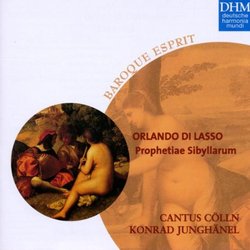| All Artists: Orlande de Lassus Title: Orlando di Lasso: Prophetiae Sibyllarum Members Wishing: 1 Total Copies: 0 Label: Deutsche Harm Mundi Release Date: 7/19/2002 Album Type: Import Genres: Pop, Classical Styles: Vocal Pop, Opera & Classical Vocal Number of Discs: 1 SwapaCD Credits: 1 UPC: 054727785429 |
Search - Orlande de Lassus :: Orlando di Lasso: Prophetiae Sibyllarum
 | Orlande de Lassus Orlando di Lasso: Prophetiae Sibyllarum Genres: Pop, Classical
|
Larger Image |
CD Details |
CD ReviewsExcellent Chansons and Madrigals Richard A. Cavalla | NJ, USA | 01/27/2003 (4 out of 5 stars) "This one-to-a-part recording is a bargain at any price. The choir consists of one soprano, one male alto, one tenor, and one bass (a few of the chansons/madrigals include a second tenor part). The chansons and madrigals manage to be both energetic and sensitive, and are a real treat, especially if you only know Lassus' sacred output. I deducted a star because I am not quite convinced by their performance of the austere, chromatic Prophetiae Sibyllarum. I think their austerity borders on blandness at times, and I am also not sure I care for the lute continuo. The lute continuo is fine in the chansons and madrigals, but I do not like it in a Latin work like Prophetiae Sibyllarum. The complexity of the work also gives the lute less room to "move in", if that makes any sense! But it is only 20 minutes out of a 70 minute disc, and the 50 minutes of chansons and madrigals are really wonderful, and make the disc well worth adding to any collection of Renaissance music." Thank goodness for audio samples J. David Stech | Chicago, IL United States | 05/06/2004 (1 out of 5 stars) "Way too much vibrato!!! Stay away. You won't hear the actual music. Get the Hilliard ensemble recording or some other group you can trust to sing the music with the correct technique and style, i.e. senza vibrato. I'm glad I could listen to the audio sample: now I know not to buy and waste money. I'd rather pay more for something I can listen to." Roland de Lassus, Orlando di Lasso, a Rose by Any Name! Giordano Bruno | Wherever I am, I am. | 10/16/2008 (5 out of 5 stars) "The most international of composers, Roland de Lassus (1532-1594) is to 16th Century muisic like the waist of an hourglass; all the sounds of Flanders, France, Italy, and Germany of the generation before flow into him, and all the sounds of the the coming generation, especially the great Italian madrigalists, flow out of him. His synthesis is as polyglot as his languages; he was fluent in Latin, French, Italian, and German, and the first three languages are represented on this CD. (I have to give the CD seven stars, so that I can deduct two for not including texts in the not booklet!) But Lassus is the sort of composer whose music can't be improved by addition or subtraction; it is absolutely correct in itself, so polished in its style that later madrigals can't possibly sound more advanced, only different.
One of the wonderments of the High Renaissance was the fusion of pagan roman iconography and literature with Christianity. The Latin hexameters of the so-called Sybilline books are a weird mixture of pagan and christian prophecies. Lassus was inspired by the paintings of the Four Sybils by Raffaelo in the Church of santa Maria della Pace in Rome to compose his four-part setting of the Latin texts as an allusion to the "tetrachord" principles of musical antiquity. In his position as musical lynchpin of the Bavarian coourt in Munich, by the way, Lassus was perhaps the first self-conscious reviver of "early music" - that is, of music from the two or three generations of composers before himself. He carefully staged concerts of motets and masses by Brumel, Josquin, and others defunct, and the scores he had copied for his singers are the only sources for such music as Brumel's 12-voice mass Et Ecce Terrae Moto. The six madrigals using texts in Italian by Petrarch and the nine short French chansons on this CD, all in five parts, are a fine sample of the hundreds of such pieces that Lassus composed, as effortlessly as breathing. And the five singers of Cantus Coelln - Johanna Koslowsky, Graham Pushee, Gerd Turk, Wifried Jochens, and Stephan Schreckenberger - sing them with the appropriate graceful effortlessness. Konrad Junghaenel scatters the phrases of his lute accompaniment among their voices like cherry blossom petals on a manicured lawn of tunefulness. This performance is as elegant as any I've ever heard of Lassus, or from Cantus Coelln." |

 Track Listings (16) - Disc #1
Track Listings (16) - Disc #1